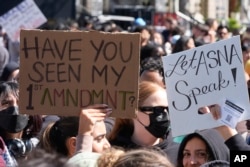This week, the University of Southern California canceled its commencement address for its senior class, amid a growing debate on limits on free speech on U.S. college campuses.
Asna Tabassum, a Muslim biomedical engineer major at USC, was selected from a pool of 100 outstanding students to address the Class of 2024 in May. However, the school withdrew her invitation to speak at the graduation ceremony due to safety concerns.
Tabassum condemned the decision, which she attributed to her public support for Palestinian human rights. She said it was part of “a campaign of hate aimed at silencing my voice.”
The school insists this is a safety issue and has nothing to do with free speech. School officials said they received an alarming number of violent threats after choosing her as a speaker.
USC is one of many U.S. universities struggling with free speech and campus protest policies since October’s Hamas terror attacks on Israel and ongoing fighting in Gaza. After weeks or months of campus protests and rallies, schools have taken more forceful action to punish protesters who administrators say have become disruptive.
At New York’s Columbia University, police arrested more than 100 students who gathered on campus for a pro-Palestinian protest on Thursday. The school’s dean wrote that protesters were told multiple times that they were violating university policy and would be suspended. The students said they were exercising their right to free speech.
At American University in Washington, the president has banned protests in all campus buildings since January. Under the new policy, students are not allowed to hold rallies, conduct silent protests or display posters in any campus building.
Protests and safety
College students have a long history of participating in political activities. From the Vietnam War to abortion rights, universities have played a key role in American political debates.
However, students now say schools like AU, which has a long culture of protest, are using new rules to silence protesters.
Arusa Islam, incoming president-elect and current vice-president of American University’s student body, said the policies hinder public discussion about U.S. foreign policy.
“Indoor protests have never been an issue, never been an issue before October 7,” Islam said. “Students are allowed to put up posters in buildings and students are allowed to conduct silent protests.”
“Now we no longer have that right,” she added. “We were outgunned and that affected us a lot.”
American University President Sylvia Burwell said the school’s new policy is intended to ensure protests do not disrupt university activities.
Burwell also cited recent incidents on campus that have “made Jewish students feel unsafe and unwelcome.” She added that anti-Semitism is abhorrent, wrong and will not be tolerated at American University.
While administrators insist they are making narrow restrictions to provide education, critics say the policies have far-reaching consequences.
At Cornell University, where the new rules took effect in January, Claire Dinh, executive vice president of the Cornell Student Association, said the policies are having a troubling impact on campus.
“Recently, the campus atmosphere at Cornell University has become tense over free speech,” Ding emailed VOA.
Ding said both students and teachers believe the policy has a chilling effect on free speech.
She added: “Students reported facing arbitrary and escalating penalties for violating the policy, and the policy itself lacked a clear outline of the consequences of civil disobedience.”
In its new policy, Cornell University warns students that protests may result in disciplinary action if they impede personnel or traffic, damage school property or interfere in any way with school operations.
The new policy will ensure that expressive activities are allowed but must remain non-violent, the school wrote in a campus-wide notice explaining the new guidelines.
The Foundation for Individual Rights in Education, also known as FIRE, tracks free speech issues on U.S. campuses.
Fire and University Pulse Beginning in 2022, we conducted an annual survey that ranked colleges based on their policies and student ratings of the free speech climate on campus.
This year, the group reported that an “alarming number” of students said they self-censored or “found their administration unclear” on free speech issues.
“College campuses have always been a place for students to express their opinions, and with the recent conflict in Gaza following the 10/7 attacks, both sides of the issue are very Intense.”
Harvard ranked last in this year’s survey. FIRE said the school has punished some professors and researchers for what they said or wrote, and students also reported a poor atmosphere for free speech on campus.
The controversy came to Congress late last year when the president of Harvard University testified about widespread complaints of anti-Semitism.
“I don’t think there are many students on campus right now who think of us as a model for a thriving free speech and exchange of ideas in this country,” J. Cyrus Hill, president of the Harvard Crimson, Harvard’s campus newspaper. Sellers Hill said.
“But I think you do see the buy-in from administrators and it seems like it’s something they’re committed to taking on.”
As head of the Harvard Crimson, Hill oversaw the paper’s 350 editors and 90 reporters, who detailed the ongoing free speech/protest controversy and former President Claudine Gay’s response to Congress Resignation after testifying.
“I don’t think anyone can dispute that Harvard has a lot of work to do and a lot of progress,” Hill said. “I think Harvard is unique among institutions of its kind in terms of intolerance of speech, and that’s hard for me to accept. It’s not consistent with what I see on our campus or other campuses around the country. I think Harvard’s standards are higher.”
Follow us on Google news ,Twitter , and Join Whatsapp Group of thelocalreport.in
